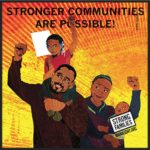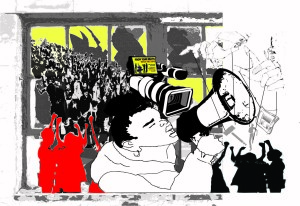In 2016, a group of public health students, researchers, and organizers felt that it was past time for the public health field to take a stand on the issue of policing  and its harms. They recognized the daily violence of policing against Black people, other people of color, people with disabilities, LGBTQ people, people experiencing homelessness, and other marginalized communities as a devastating and pervasive public health issue, and that there needed to be a more urgent effort to advance people-oriented solutions.
and its harms. They recognized the daily violence of policing against Black people, other people of color, people with disabilities, LGBTQ people, people experiencing homelessness, and other marginalized communities as a devastating and pervasive public health issue, and that there needed to be a more urgent effort to advance people-oriented solutions.
These public health advocates collaborated to write and pass a policy statement through the American Public Health Association (APHA)* that names policing as a public health issue and urges for steps to decrease its power, including:
- divesting public resources from policing and investing instead in racial and economic equity;
- eliminating policies such as gang injunctions and anti-homelessness laws that lead to harrassment of and violence against specific communities;
- decriminalizing many activities;
- decreasing the acquisition and use of military equipment and reducing the number of SWAT teams and the frequency of their deployment;
- supporting alternative practices for creating community safety and addressing harm that do not rely on repression and surveillance.
- You can read the full statement here.
The tireless grassroots protests in recent years against the violence of policing meant that such a statement could not be ignored. The statement was approved as policy for a one-year term. This is a unique victory that we are calling on you to help amplify!
TAKE ACTION:
Organizations and individuals, please join us and endorse the statement! Fill out this form. Your name(s) will be added to the growing list, below. We encourage you to uplift the statement and its recommendations in any of the following ways:

- Feature the statement and the recommendations on your website or social media. Post a link to this page or the statement and tell your audience how this statement connects to your mission or current campaigns and projects. Quote an impactful phrase or Action Step (see Action Steps, the APHA recommendations, below).
- Share it with your networks in a letter or email announcement. Include an intro of how and why it relates to work of organization. See Critical Resistance example here.)
- Use it in advocacy work– to bolster testimony, to strengthen letters to decision-makers, or call people to action.
- Quote it to the media if you’re doing a campaign around the harms of policing. This can be in a press release, an article or through a speaker at a press conference.
- Are you an educator? Include it in your curriculum this year.
Organizations and individuals, you can endorse here.
* The APHA is a professional association with over 25,000 members that adopts policy statements which they use to inform advocacy efforts of organizations and its members.
We hope that this statement will be useful for groups struggling on the ground against the violence of policing—both in advancing your campaigns and defending against attacks from forces seeking to undermine your efforts. Critical Resistance is joining forces with these dedicated health advocates and uplifting this statement as a tool for our movements to utilize.
The statement won approval for a one-year term. The authors are in a process now of revising the statement and organizing for its permanent adoption. Regardless of what the APHA decides for next year, we very much hope that groups will use the statement now while it is official APHA policy!
We welcome any feedback or questions you may have. If you do use the statement, or have other ideas for how groups might use it, please let us know! Questions for the policy statement team can be sent to: endingpoliceviolence@gmail.com; Questions for Critical Resistance can be sent to: CRnational@criticalresistance.org
Excerpt from the statement (read the full statement here)
Conclusion: Public safety is essential for public health. However, as a society, we have delegated this important function almost exclusively to the police. Evidence shows that US policing has failed to deliver safety, placing an inequitable burden of harm on some communities, particularly communities of color. Community-centered strategies for addressing harm and violence have the potential to increase public safety without the violence associated with policing. Investment in these strategies, as well as those that address underlying social and economic factors associated with crime, provides a promising way forward toward strengthening communities while reducing the harms associated with policing.
Action Steps
Therefore, APHA:
- Urges the U.S. Council of State and Territorial Epidemiologists to work with other public health experts to create uniform case definitions and surveillance protocols to monitor injuries and deaths caused by law enforcement officials.[15]
- Urges that Congress fund the National Institute of Justice and the Centers for Disease Control and Prevention to conduct research on the health consequences, both individual and community-wide, of police harassment and violence, particularly exploring the disproportionate burden of morbidity and mortality among people of color; people with disabilities or mental illness; people who are experiencing homelessness; gay, lesbian, bisexual, and transgender populations; and immigrant populations.
- Urges federal, state, and municipal governments to address the root causes of instability and violence in communities (also known as the social and structural determinants of health) by using resources currently devoted to law enforcement to increase economic and racial equity, including investing in employment and educational opportunities and affordable housing.
- Urges federal, state, and municipal governments and law enforcement agencies to engage independent organizations in a review of law enforcement agencies’ formal and informal policies and practices and eliminate those that lead to disproportionate harassment and violence against specific populations. Examples of such policies and practices may include racial and identity profiling, stop and frisk, gang injunctions, and enforcement of laws that criminalize homelessness. A necessary first step would be to restore the intent of the Fourth Amendment to “probable cause” from “reasonable suspicion” for searches.
- Urges federal, state, and municipal governments and law enforcement agencies to reverse the militarization of the police, including decreasing the acquisition and use of military equipment and reducing the number of SWAT teams and the frequency of their deployment. Restoring the division between the Armed Forces and the civilian police, as was law in the original Posse Comitatus Act of 1878, should also be pursued.
- Urges federal, state, and municipal governments to decriminalize and eliminate police enforcement of as many activities as possible, including but not limited to drug use and possession, sex work, loitering, sleeping in public, minor traffic violations (e.g., expired registrations, jaywalking, not signaling a lane change, broken taillights), and residing in the United States without documentation.
- Urges federal, state, and municipal governments to divert funding from law enforcement agencies to community-based programs that address violence and harm without criminalizing communities, including mental health intervention, violence prevention and intervention, and conflict mediation programs, particularly in the communities currently most affected by police harassment and violence.
- Urges that all localities establish elected, independent community-based review boards with the power to write and monitor policies; subpoena, discipline, fire, and prosecute law enforcement officers; and consider all complaints of officer brutality, excessive use of force, harassment, and filing of false reports.
- Urges state legislative bodies to repeal the Law Enforcement Officers’ Bill of Rights and similar policies that shield police officers from investigation and accountability.
- Urges law enforcement agencies and oversight bodies to strictly enforce police guidelines, including codes of ethics, and international human rights standards, with strong disciplinary measures for the abusive use of force and firearms.
- Urges law enforcement agencies and oversight bodies to provide full public disclosure of all investigations of police brutality and excessive use of force as well as access to recordings of any incidents in question, which should be deemed public property.
